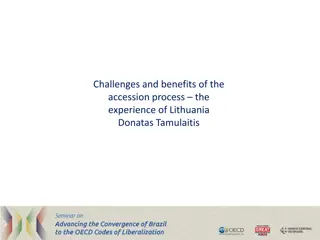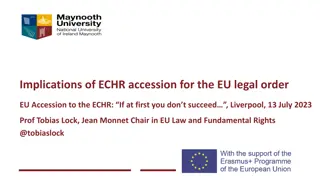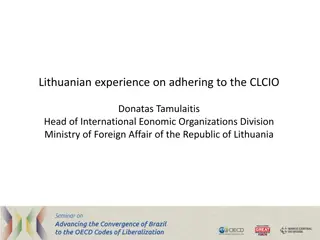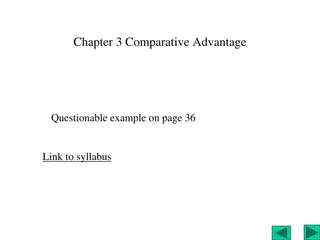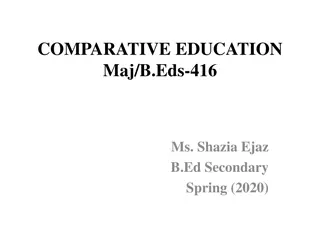The Accession of Darius: A Comparative Analysis
Explore the two versions of King Darius's rise to power following Cambyses' death in 522 BC. Compare the accounts from Herodotus and Darius's Bitsitun Inscription, highlighting similarities, differences, and potential propaganda elements. Delve into the intriguing narrative complexities surrounding Darius's accession to the Persian throne.
Download Presentation

Please find below an Image/Link to download the presentation.
The content on the website is provided AS IS for your information and personal use only. It may not be sold, licensed, or shared on other websites without obtaining consent from the author. Download presentation by click this link. If you encounter any issues during the download, it is possible that the publisher has removed the file from their server.
E N D
Presentation Transcript
Cambyses 4. Accession of Darius I
Starter - recap Cambyses? Oh he s treated unfairly. He was actually a very successful King of Persia, who treated his subjects well, and ruled properly How far do you agree with this statement? Give 3 reasons/ pieces of evidence to support your answer. Think about the Egyptian administrator, UDJAHORRESNE! He liked Cambyses! -
14 September Title: The Accession of Darius 2024 RRR: What are the two different versions of Darius rise to power? Accession = rise to power/ rise to the throne! Lesson Objectives: L.O. to understand and explain the events surrounding the accession of Darius. L.O. to begin assessing the reliability of the both accounts.
When Cambyses died When Cambyses died in 522, there was a power vacuum which was filled within a few months by his distant relative, Darius. We have the story of Darius accession to the kingship from two sources: the version of Herodotus and Darius own account found on a public inscription in the heart of Persia, the Bitsitun inscription. The two accounts agree in a number of ways, and it seems that Herodotus was familiar with the account of Darius. However, Darius account raises great suspicion that it was a piece of propaganda designed to hide a dark truth of murder
The two versions of events TASK 2: using what you now know about each story, crate a table of similarities and differences between the two stories. Details that are the same in both, and then details that are unique to one of the stories. TASK 1: using textbook pages 29-31, and the sections of Herodotus and the Bitsitun Inscription, create two flow charts that explain each story of how Darius came to power. Similarities between the two stories Differences between the two stories Herodotus version of events 1. 2. Darius version of events 3. 4.
Bisitun Inscription King Darius says: The following is what was done by me after I became king. A son of Cyrus, named Cambyses, was king here before me. That Cambyses had a brother, Smerdis by name. Afterwards, Cambyses slew this Smerdis. When Cambyses slew Smerdis, it was not known that Smerdis was slain. Thereupon Cambyses went to Egypt. When Cambyses had departed into Egypt, the people became hostile, and unrest multiplied in the land, even in Persia and Media, and in the other provinces. King Darius says: Afterwards, there was a certain man, a Magian, Gaum ta by name, who raised a rebellion. On the fourteenth day of the month he rebelled. He lied to the people, saying: "I am Smerdis, the son of Cyrus, the brother of Cambyses." Then were all the people in revolt, and from Cambyses they went over to the pretend Smerdis, both Persia and Media, and the other provinces. He seized the kingdom; afterwards, Cambyses died of natural causes. King Darius says: The kingdom of which the false Smerdis, the Magian, dispossessed Cambyses, had always belonged to our dynasty. King Darius says: There was no man, either Persian or Mede or of our own dynasty, who took the kingdom from Gaum ta, the Magian. The people feared him exceedingly, for he slew many who had known the real Smerdis. For this reason did he slay them, "that they may not know that I am not Smerdis, the son of Cyrus." There was none who dared to act against the false Smerdis, the Magian, until I came. Then I prayed to Ahuramazda; Ahuramazda brought me help. I, with a few men, slew that false Smerdis, the Magian, and the chief men who were his followers. At the stronghold in Media, I slew him; I dispossessed him of the kingdom. By the grace of Ahuramazda I became king; Ahuramazda granted me the kingdom. Slew = killed/ to killDispossessed = to take something from someone
Herodotus Darius accession Otanes was the first to guess that the Magus (false Smerdis) was not Cyrus' son Smerdis and who, in fact, he was; the reason was, that he never left the acropolis nor summoned any notable Persian into his presence. When they (the men who believed Smerdis was a pretender) numbered six, Darius, whose father, Hystaspes, was a governor of the Persians, arrived at Susa. When he came, then, the six Persians resolved to include Darius too. Darius said, I thought that I alone knew that it was the Magus who was king and that Smerdis son of Cyrus was dead; and it was for this reason that I made haste to come, that I might effect the Magus' death; but since it turns out that you know too and not only I, I think that we should act at once and not put it off. Darius argued that There is no one who will not allow us to pass, from respect or from fear, because of who we are . The seven Persians, when they had decided to attack False Smerdis at once and not delay, prayed to the gods and set forth When they came to the gate, it turned out as Darius had expected; the guards, out of respect for the leading men in Persia and never suspecting that there would be trouble from them, allowed them to pass, and no one asked any questions When they had killed False Smerdis and his followers and cut off their heads, they left their wounded there because of their infirmity and for the sake of guarding the acropolis, while five of them carrying the heads ran outside with much shouting, calling all Persians to aid, telling what they had done and showing the heads. As for the making of a king, they decided that he should be elected whose horse, after they were all in their saddles in the suburb of the city, should first be heard to neigh at sunrise. At dawn of day the six came on horseback as they had agreed. As they rode out came to the place where the mare (female horse) had been tethered in the past night, Darius' horse trotted forward and whinnied; and as he so did there came lightning and thunder out of a clear sky. These signs given to Darius were thought to be foreordained and made his election perfect; his companions leapt from their horses and bowed to him.
Differences between the two versions of events On the other side of the argument, why should we believe Herodotus? He says that he speaks to people who have a direct link to the event, but is that necessarily true? Darius version of events, found on the Bisitun inscription, doesn t mention anything about the planning of the 7 men, or the trickery to get his horse to neigh first at sunrise. What reasons might Herodotus have for portraying the Persian King as somewhat illegitimate? Why might Darius account have missed these details out? What can we learn about Darius character, IF we believe Herodotus version of events?


